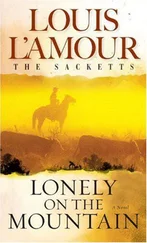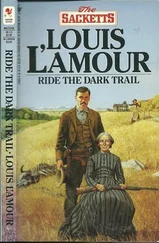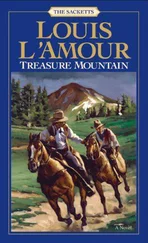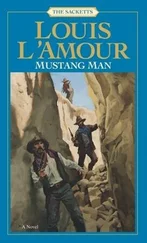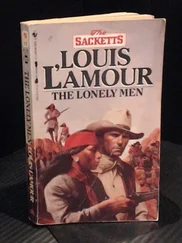At the bar there was subdued muttering and glances cast in their direction. More men drifted into the bar, but a difference of opinion was obvious. Jean knew there would be no chance to sleep here now. They must ride, and at once. The man in the dark suit turned on them. "You two stay in town until we decide what to do about this, you hear?"
LaBarge got to his feet. "Listen to me, mister. You said before this wasn't your fight, so don't make it yours. Those men were trailing us to rob us, and if any of you want to keep us here, you just stand out in the street. In ten minutes we'll be riding out with our rifles across our saddlebows." He paused, letting it sink in. "And, mister, if you feel lucky, you just try stopping us."
Ten minutes later, mounted on a horse loaned him by Charley Brastow of the stage company, Jean LaBarge rode out of town with Ben Turk beside him. The man in the dark suit stood on the steps of the saloon chewing on a cigar, several men around him, but he made no move.
"I seen them come in," Brastow had said, "an' I can smell a bad one further'n most. They sized up your horses and asked where you went." He looked over their horses. "I'll credit you with fifty apiece for the horses and you can leave mine at Johnson's Camp on Hungry Creek. Tell him you're to have the two grays."
Johnson met them at the corral as they rode up. He was a tall man with no chin and he came from his clumsily built log cabin on the run. "Get the grays for us, will you? Brastow said we were to have them. We're riding on to Portland."
Johnson's Adam's apple bobbed against his frayed collar. "That's crazy, stranger! Pure dee crazy! Them Modocs killed a trapper up the crick yestiddy, and burned a couple of farms! Mister, you two wouldn't have a chance against 'em!"
Jean took a rope from the corral post and shook out a loop. One of the grays shied but he swung his loop and made an easy catch. Both were magnificent horses, and as he roped them, Ben stripped their gear from the others. Still protesting, Johnson watched them mount up and ride off. Both men were dead tired. Their plan to sleep in Yreka had been blasted by impending trouble. Jean's eyelids felt thick and heavy, and he rode as did Ben, in a sort of stupor.
Hours later they were walking their horses along Bear Creek bottom when a bullet struck water ahead of them and whined away into the brush. Glancing around they saw five Modocs come out of the trees on their right rear, and fan out as they came down the meadow at a dead run, whooping shrilly. "Make the first one count, Ben." Jean lifted his rifle and looked down the barrel. He was wide awake now. He took a long breath, let it out easy and tightened his finger on the trigger. The rifle jumped in his hands and the foremost Modoc fell face forward from his running horse. The report of Ben's rifle was only an instant behind his own, and a horse fell, spilling its rider. Both men were using the Porter Percussion Turret rifle, .44 caliber, firing nine shots. Steadying himself, Jean fired twice more and saw Ben's second man swing away, clinging to his horse with only a mane-hold, his body slumped far forward. The Modocs drew off, two men gone, another wounded, and shaded their eyes after Jean and Ben Turk. Accustomed as they were only to single-shot rifles, the burst of firing was too much for them.
At Jacksonville they stopped for coffee and sandwiches, and an hour farther along they mounted a tree-covered knoll and caught an hour's sleep, trusting the horses to awaken them if Indians approached. Twice more they exchanged horses, giving up the grays with reluctance, knowing such horses were rare. They passed the place called Jump-Off Joe, and later, crossing Cow Creek, they saw more Indian signs. At Joe Knott's Tavern they exchanged horses again. After a meal and a short rest they pushed on.
An hour out of Knott's it began to rain and with less than two hundred miles to go they spotted a cabin, barn, and corrals. Beyond was some forty acres of stubble. They rode toward the cabin, hallooing their presence. A man with yellow side-whiskers stood in the door, rifle in hand. "Light an' set, strangers," he invited, "you're the first folks we seen in two weeks." "Modocs are raiding," Jean explained, then jerked his head to indicate the stubble. "What was that ... wheat?"
"Uh-huh."
"I'll buy it. How much have you?"
"Done sold it, mister. Feller name of Bonwit from Oregon City bought wheat all through here. Why, he must have upward of two thousand bushels headed for the Willamette."
A meal and thirty minutes later they stepped into the saddle. Bonwit of Oregon City was the man to see.
He was a stocky man in a store-bought suit and a cigar clamped in his hard mouth. His face was wide, his hair sparse and rumpled. He rolled his dead cigar in his jaws and spat into a brass spittoon. "I'll sell," he said flatly, "for cash!"
"I'll take two thousand bushels, delivered in Portland," LaBarge said, and began counting out the gold.
Bonwit rolled his cigar again and shot a glance at LaBarge from astonished eyes.
"You carried that over the trail ... just you two?"
"Part of the way we had Modocs with us."
They sold their horses in Portland and pocketed the money. They had ridden six hundred and sixty-five miles in one hundred and forty-four hours.
Chapter 14
Baron Paul Zinnovy sat at his desk in a San Francisco hotel. The wheat had been destroyed but LaBarge had vanished, and it worried him. A close watch had been kept on the schooner until it sailed; LaBarge was not aboard. He paced the floor, scowling. Rotcheff seemed willing to remain right here in San Francisco, and as long as he did so, he would be safe. He had his instructions as to Rotcheff but nothing could be done here. If Rotcheff was lost at sea farther north there would be no investigation but his own. Or at a landing on one of the lesser islands they might be attacked by the Kolush... Officially, the Russian American Company was losing money, but actually a few key men were doing very well indeed between paying low prices to the promyshleniki and padding expenses in stockholders' reports. If Rotcheff succeeded in getting wheat to Sitka conditions would be alleviated and prices could no longer be held down.
It was dangerous to leave Rotcheff unwatched. There were Boston men here in San Francisco who could offer evidence on the cruelties of the Company, and Rotcheff could choose his own time to come north--perhaps one inopportune for Zinnovy. None of his agents had learned anything of LaBarge. On the evening of the fire he had been seen riding with Helena de Gagarin, but had dropped off the world right after that, and whatever she knew she was keeping to herself. Without wheat LaBarge could not really cause any serious trouble, and yet it was strange that he should have disappeared. Still, the thing to do was to take one thing at a time and the first was Rotcheff.
The Susquehanna, as Jean LaBarge had renamed the schooner, arrived in Portland only a few hours after he did. Knowing that if he reached Sitka before the Baron Zinnovy his chances would be greater to get the cargo of fur he wanted, he laid his course for Queen Charlotte Sound as soon as the last of the wheat was aboard.
Clearing the mouth of the Columbia with a cold wind kicking up whitecaps around them, the Susquehanna lay over on her side and took the bone in her teeth, pointing her bows into the cold northern seas as if anxious for the green water that lay ahead.
LaBarge, his wind-brown face wet with flying scud and spray, stood beside Larsen at the wheel, watching her move along under a full head of sail. His sea boots and oilskins were shining wet, the sky was gray and lowering with clouds, but the wind was good.
"How was the trip up the coast?"
"Flying fish sailing ... it was good time."
Читать дальше


